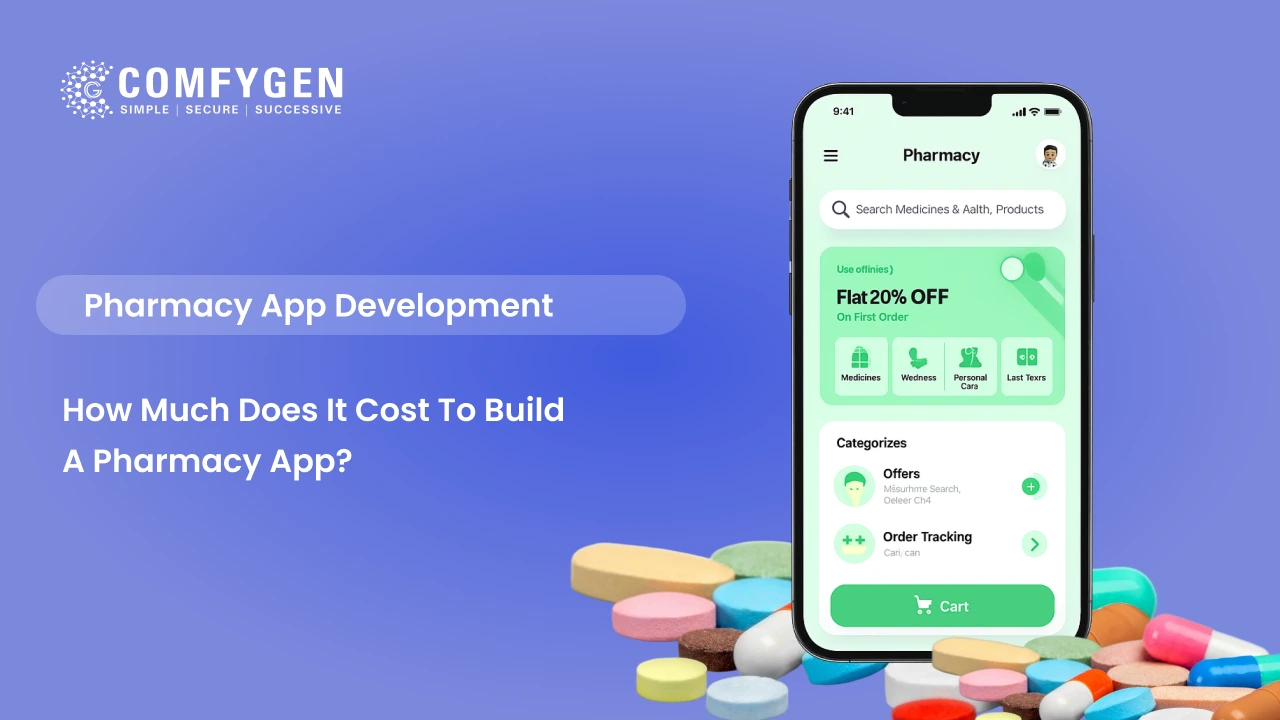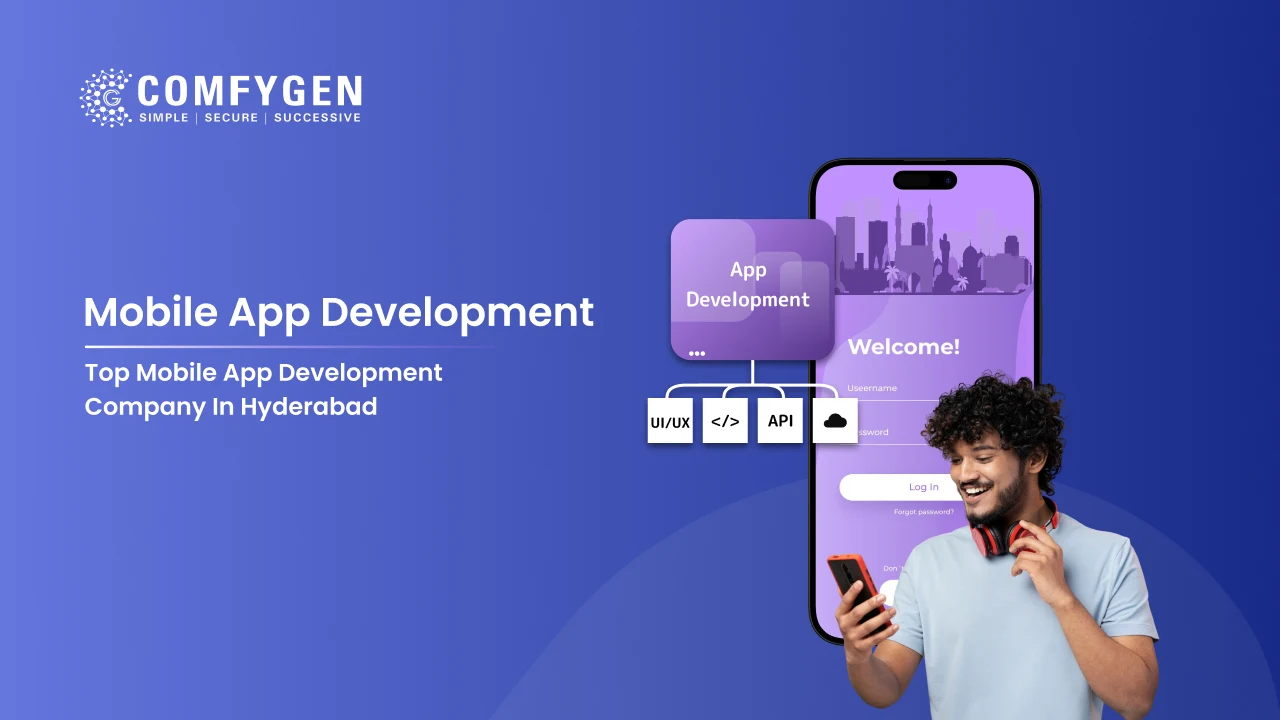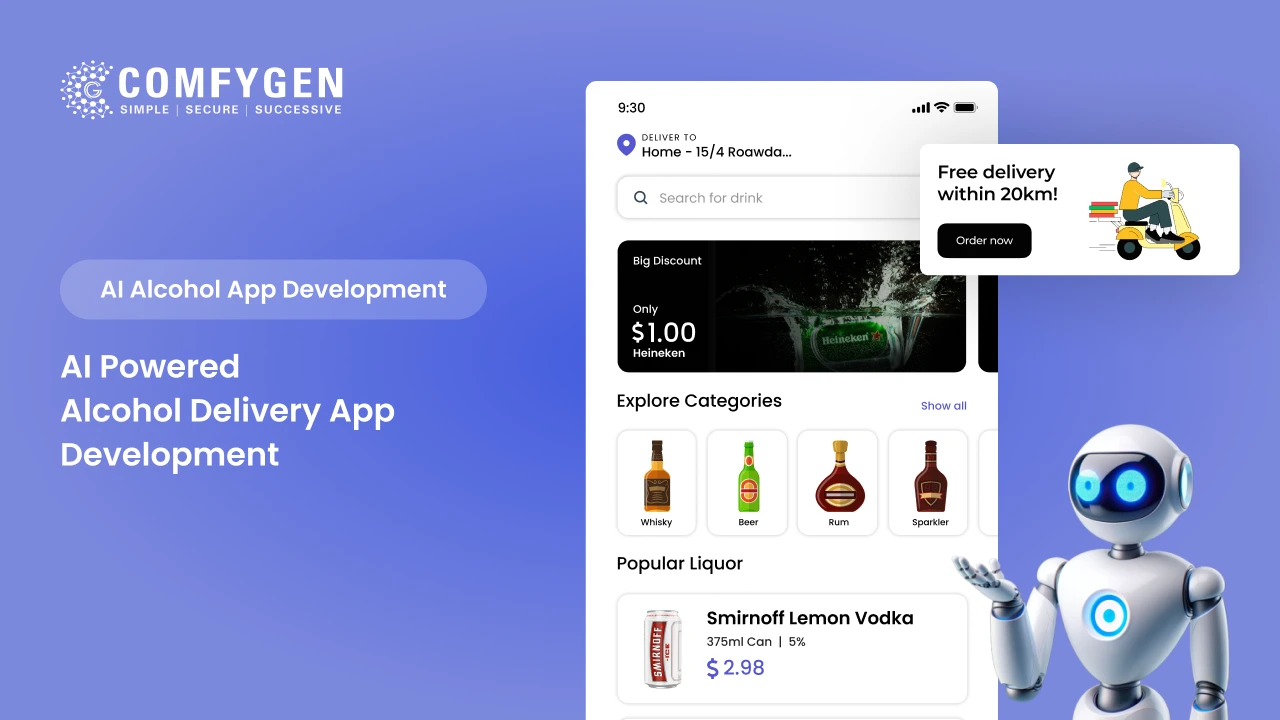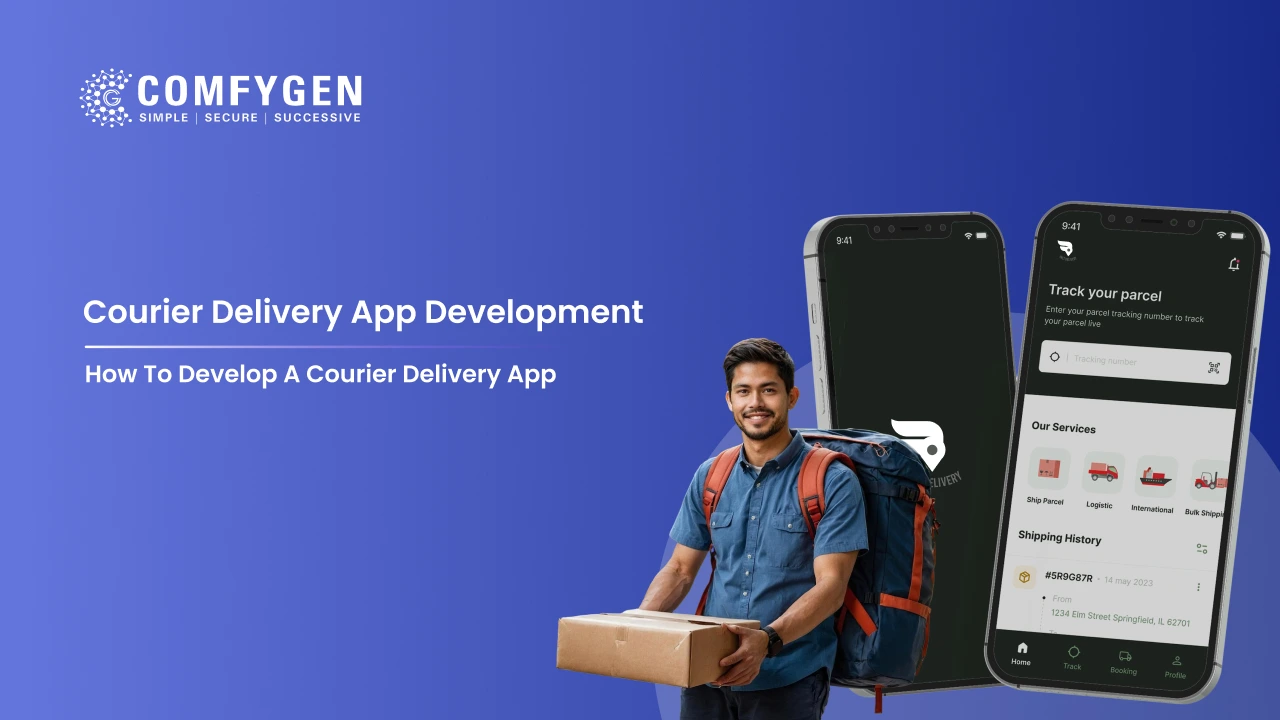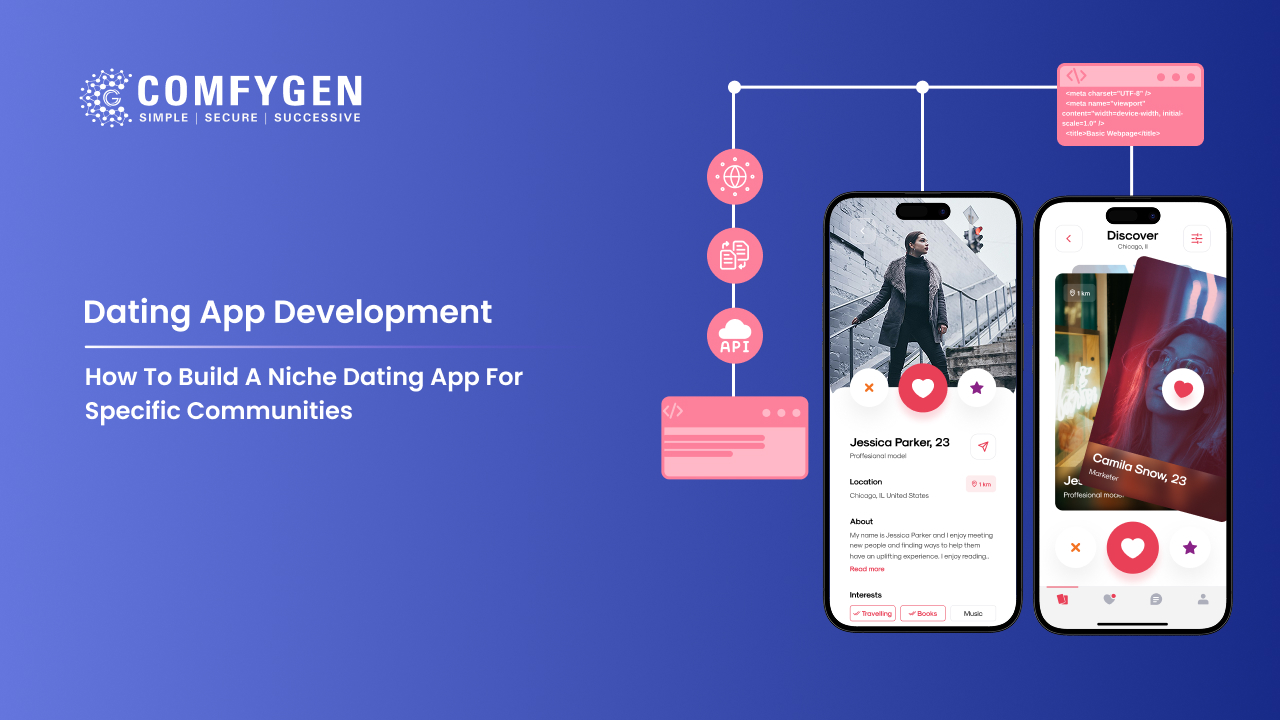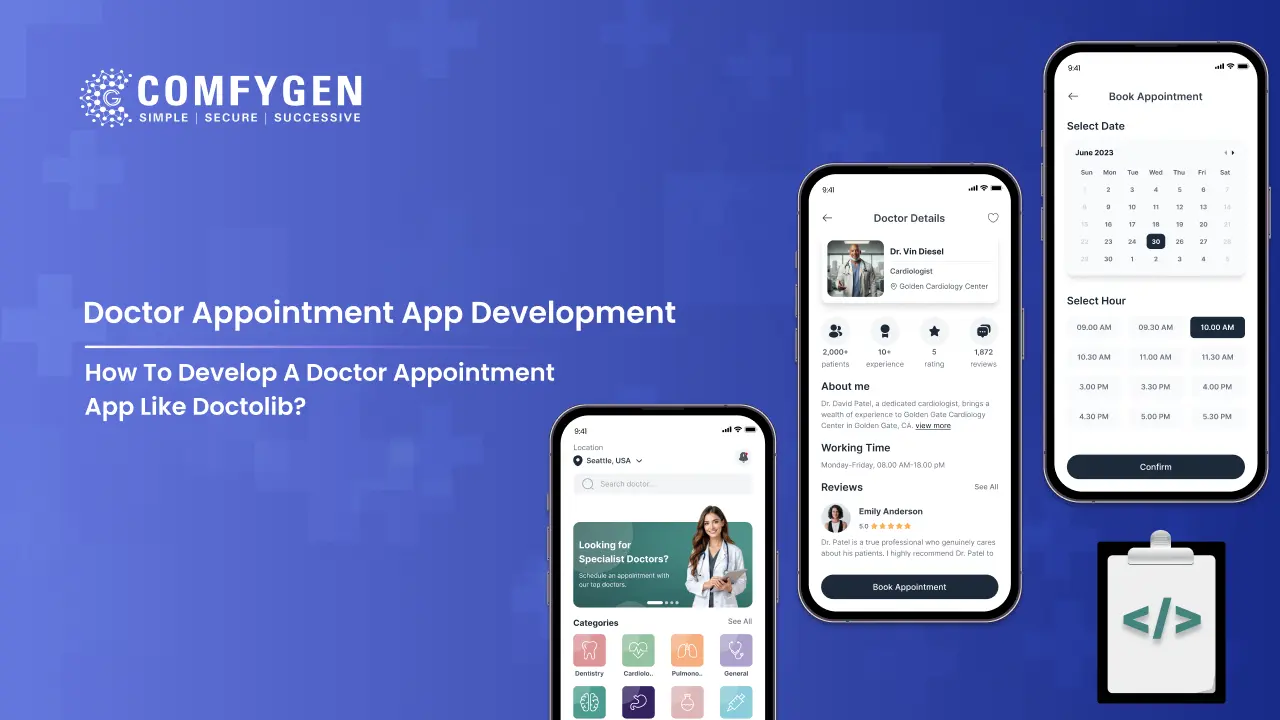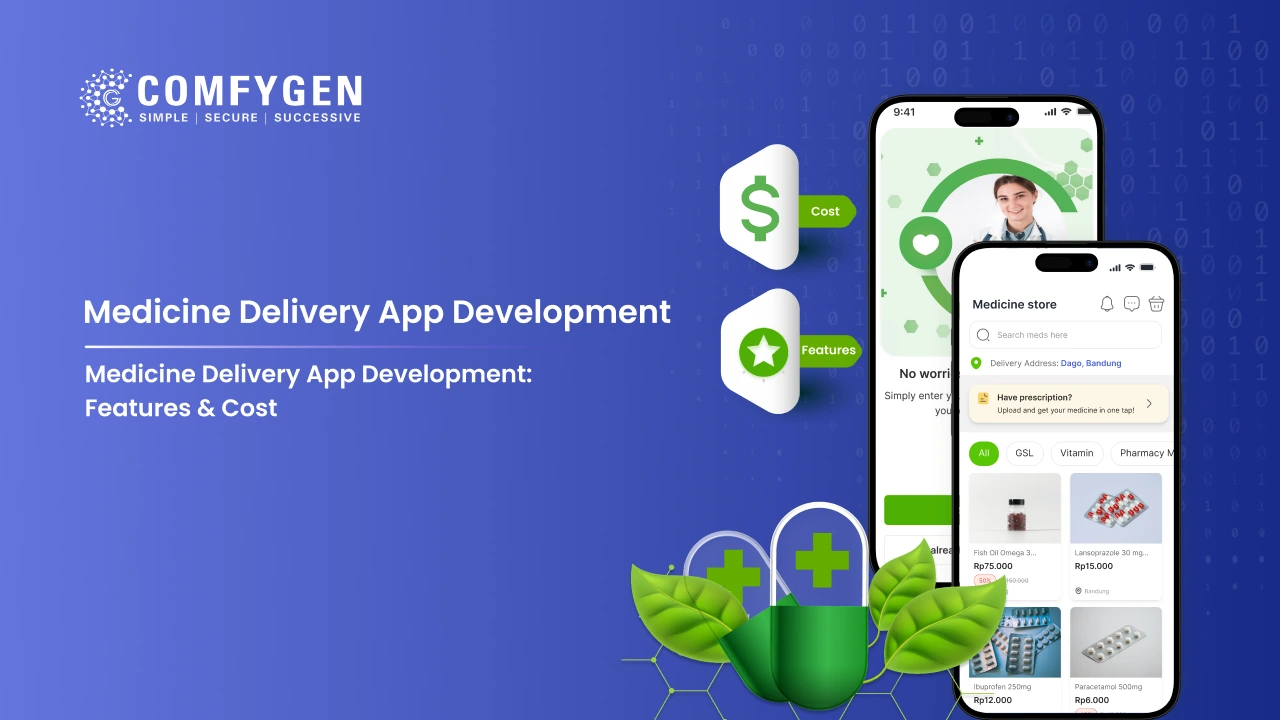The demand for online medicine delivery and digital healthcare services has grown faster than ever before. Today, most people prefer ordering medicines online rather than visiting a physical pharmacy. This shift in customer behavior has encouraged many businesses, startups, and pharmacy owners to invest in their own pharmacy mobile apps.
But the question everyone asks is: How much does it cost to build a pharmacy app?
The answer depends on several factors like app features, design, platform, development region, and technology. In this detailed blog, you will learn everything about pharmacy app development cost, the complete cost breakdown, features, tech stack, development timeline, and smart ways to reduce the overall cost.
What is a Pharmacy App?
A pharmacy app enables users to order medicines, upload prescriptions, schedule deliveries, and get virtual pharmacist support. These pharmacy delivery apps can serve patients, pharmacists, and delivery staff through dedicated user panels.
Common Types of Pharmacy Apps:
-
Medicine Delivery Apps like 1mg, Netmeds
-
Online Prescription Management Apps
-
B2B Wholesale Pharmacy Apps
-
Telepharmacy Apps
-
Pharmacist Consultation Apps
Why Invest in a Pharmacy App?
Before calculating the pharmacy app development cost, it’s important to understand why so many businesses are choosing to build their own online pharmacy app. The digital healthcare market is expanding quickly, and customers now expect fast, convenient, and reliable medicine delivery services. A pharmacy app helps you meet these needs while boosting business growth.
Below are the major benefits of investing in pharmacy app development:
Growing Market Demand
The demand for online medicine delivery is increasing worldwide. People prefer ordering medicines from their smartphones rather than visiting a physical store. This shift in customer behavior has created a huge opportunity for businesses.
A pharmacy app allows you to:
-
Serve a large number of customers online
-
Offer easy access to medicines
-
Deliver orders at customers’ doorsteps
The growing popularity of online pharmacy services makes it the perfect time to invest in pharmacy app development. With market growth rising every year, your business can benefit from early entry and strong brand positioning.
High Revenue Potential
One of the biggest reasons businesses are investing in online pharmacy apps is the high earning potential. The revenue opportunities are diverse and long-term.
You can earn through:
-
Delivery charges
-
Commission on every order
-
Subscription plans
-
In-app advertisements
-
Selling wellness and healthcare products
-
Premium services like fast delivery
These multiple income sources help you recover the cost to build a pharmacy app quickly and start generating profit.
Better Customer Experience
Customer convenience is one of the key drivers of online pharmacy success. A pharmacy app improves user experience by offering:
-
Easy medicine search
-
Uploading prescriptions digitally
-
Quick checkout and secure payments
-
Home delivery
-
Refill reminders
-
Order tracking in real time
When customers get a smooth and hassle-free experience, they prefer your service over competitors. A great user experience also ensures more repeat orders, which increases your revenue.
Automated and Efficient Operations
Running a physical pharmacy involves a lot of manual work — checking stock, managing orders, verifying prescriptions, and handling customer queries. A pharmacy app automates most of these tasks.
With online pharmacy app development, you can streamline:
-
Inventory and stock updates
-
Order management
-
Prescription verification
-
Payment tracking
-
Customer communication
-
Sales reporting
Automation not only reduces mistakes but also saves time and operational costs. This improves overall efficiency and boosts your business performance.
Digital Transformation and Competitive Advantage
The healthcare industry is shifting toward digital solutions, and businesses that adapt early gain a strong competitive advantage. A pharmacy app helps your business stay relevant and attractive to modern customers.
It allows you to:
-
Build a strong digital presence
-
Reach customers across wider locations
-
Offer advanced features like tracking and reminders
-
Compete with big online pharmacies
-
Modernize your pharmacy business
With customers increasingly choosing online services, going digital is no longer optional — it’s essential for long-term success.
How Much Does It Cost To Develop An Online Pharmacy App?
The cost to create a pharmacy app depends on the level of complexity of the online pharmacy delivery app, and the apps can be divided into different categories like basic, mid-range, and advanced pharmacy apps. The ePharmacy app development cost for the basic and mid-range pharmacy apps might be more reasonable than the advanced ones, but for more ROI and profits, you need to invest in the advanced range.
Basic Cost of Pharmacy App Development
The basic online pharmacy app cost is around $15,000 – $25,000. The cost of a basic pharmacy app depends on the aspects that you want to develop and the addition of only the most basic features for a pharmacy app.
Mid-Range On-Demand Pharmacy App Development Cost
A mid-range pharmacy app will have most of the most needed pharmacy features and also some of the new-age features that are needed for the application. The mid-range budget is somewhere in the $25,000 – $45,000 range of USD.
Advanced E-Pharmacy App Development Cost
When the advanced pharmacy app development process is executed, the development team will include features like AI, ML, and advanced data analytics. For the inclusion of the most important features into the app, the cost of the app development can be $50,000 – $120,000+. In the next sections, you will understand the cost breakdown of such an app development process.
Factors Affecting Pharmacy App Development Cost
Suppose you are ready to develop a pharmacy app. In that case, you should collaborate with the best pharmacy app development company to get a precise cost estimate based on the cost to develop a pharmacy app. Cost estimation depends on the types of resources and the processes used in the whole development phase.
The company you choose to build a pharmacy app with also determines the cost. Take a look at the cost factors that an experienced healthcare mobile app developer takes into consideration. At Comfygen, we try to consider these factors to determine the final pharmacy app development costs.
Building a pharmacy app involves various considerations that can significantly influence its overall cost. Below are the primary factors at play:
1. Features and Functionality
- Basic Features: Essential functionalities such as prescription refills, medication reminders, and drug information will cost less to implement when building a pharmacy app.
- Advanced Features: Complex features such as e-prescriptions, telehealth services, lab results integration, and real-time medication tracking require more development time, increasing the cost to build a pharmacy app.
- Custom Integrations: Connecting the app to existing pharmacy management systems or other healthcare app development services can add additional expenses.
2. Design and User Experience (UI/UX)
- Complex Designs: High-quality, user-friendly interfaces enhance user engagement but can add 15-30% to the total cost to develop a pharmacy app.
- Responsive Design: Designing for different devices (mobile/tablet) and ensuring seamless functionality across platforms increases the complexity and cost of developing an e-pharmacy app.
3. Technology Stack
- Native vs. Cross-Platform: Building separate native applications for iOS and Android typically costs more than developing a single cross-platform app.
- Third-Party Services: Using third-party APIs for features such as payment processing or data retrieval can incur additional costs when building a pharmacy delivery app.
4. Development Team Location
- Geographical Differences: Developer location greatly affects wages. Teams in North America and Western Europe generally charge more than those in Eastern Europe or Asia.
- In-House vs. Outsourcing: Deciding whether to hire an in-house team or outsource development can also influence pharmacy app development costs.
5. Compliance and Regulations
- HIPAA Compliance: Ensuring that the app complies with healthcare regulations adds to development expenses, as it requires implementing stringent security measures.
- Data Security Requirements: Additional features for data encryption, secure logins, and user authentication will increase costs.
6. Maintenance and Updates
- Ongoing Costs: Post-launch, consistent updates and maintenance are crucial to keep the app functional, secure, and up-to-date. Budgeting for ongoing support impacts the overall financial plan.
7. Market Research and Planning
- Pre-Development Research: Conducting market analysis to understand user needs and preferences can add initial costs but may lead to more successful app design and reduced future expenses.
8. Testing and Quality Assurance
- Comprehensive Testing: Extensive testing phases to ensure functionality, usability, and security can inflate costs, particularly if multiple testing environments or devices are involved.
- User Feedback Integration: Incorporating user feedback into the design and functionality may require additional development time and resources.
9. Marketing and Launch
- Marketing Strategy: Planning for app launch marketing, including promotional campaigns and user acquisition strategies, can substantially impact the overall budget.
- App Store Optimization (ASO): Ensuring your app is easily discoverable in app stores involves additional pharmacy app development costs in SEO and promotion
Want to Launch Your Own Pharmacy App?
Cost Breakdown Of A Pharmacy App Development?
Developing a pharmacy app involves various components, each contributing to the overall cost of developing a pharmacy app. Here’s a detailed breakdown of the pharmacy app development cost elements associated with its development:
1. Pre-Development Costs
These foundational tasks are essential to begin your E-Pharmacy app development journey:
-
Market Research: $2,000 – $10,000
Helps understand user pain points, industry trends, and competitor analysis. -
Requirement Analysis: $1,000 – $5,000
Defines app features, goals, and system specifications.
2. Design Costs
UI/UX design plays a critical role in attracting and retaining users in medicine delivery apps like 1mg.
-
UI Design: $3,000 – $15,000
Includes color schemes, typography, and brand identity. -
UX Design: $2,000 – $10,000
Ensures intuitive navigation and user journeys. -
Prototyping: $1,000 – $5,000
Wireframes and clickable mockups for early testing.
3. Development Costs
The core component of the cost to build a pharmacy app lies in coding and integrations.
-
Backend Development: $10,000 – $30,000
Handles server-side logic, databases, and user management. -
Frontend Development: $15,000 – $40,000
Development of the user interface for Android and iOS platforms. -
API Integration: $5,000 – $15,000
Includes payment gateways, GPS, teleconsultation, and third-party services.
4. Team Composition and Hourly Rates
A professional team ensures your app functions efficiently and securely:
-
Developers (2–3): $50 – $150/hour
Total: $15,000 – $75,000 -
UI/UX Designer: $40 – $120/hour
Total: $5,000 – $20,000 -
Project Manager: $50 – $130/hour
Total: $5,000 – $20,000 -
QA Testers: $30 – $80/hour
Total: $3,000 – $12,000
5. Compliance and Security Costs
Healthcare apps must adhere to privacy and data protection regulations:
-
HIPAA Compliance: $5,000 – $20,000
Ensures patient data is secure and confidential. -
Security Features: $2,000 – $10,000
Includes secure logins, data encryption, and fraud prevention.
6. Testing and Quality Assurance
Quality assurance is key to maintaining high standards:
-
Manual Testing: $2,000 – $10,000
Checks user flows, bugs, and errors. -
Automated Testing: $1,000 – $5,000
Ensures long-term app stability and performance.
7. Deployment and Launch Costs
Your app must be ready for public release with proper deployment:
-
App Store Fees: $100 – $500
For Google Play Store and Apple App Store. -
Initial Marketing: $5,000 – $20,000
Promotional campaigns to attract early users.
8. Post-Launch Maintenance
Ongoing improvements are essential to keep the app relevant:
-
Maintenance and Support: $1,000 – $5,000/month
For performance upgrades and user feedback management. -
Feature Updates: $5,000 – $15,000
Adding new capabilities like AI-powered recommendations or chatbot support.
Trend Technology-Based Online Pharmacy App Development Cost
Incorporating modern technologies into your pharmacy app can significantly boost user engagement, streamline operations, and enhance app security. However, these advancements also influence the overall development budget. Here’s a breakdown of trending technologies and their impact on the cost to build a pharmacy application:
1. Telehealth Integration
Teleconsultation features are increasingly common in e-pharmacy app development costs.
-
Video Conferencing Tools (Zoom, WebRTC): Enable live doctor consultations.
Cost Addition: $5,000 – $10,000 -
AI-Powered Chatbots: 24/7 customer support and appointment assistance.
Cost Addition: $3,000 – $7,000
2. Artificial Intelligence (AI) & Machine Learning (ML)
The AI-powered pharmacy app development cost can personalize the user experience.
-
Predictive Analytics: Personalized suggestions for medicine refills and health tips.
Cost Addition: $6,000 – $12,000 -
Natural Language Processing (NLP): Improves voice search and chat interactions.
Cost Addition: $4,000 – $8,000
3. Blockchain Technology
ensures transparency and security in pharmacy delivery apps like 1mg.
-
Secure Transactions & Prescription Validation: Protect user and prescription data.
Cost Addition: $8,000 – $15,000 -
Supply Chain Management: Improve drug traceability and reduce counterfeits.
Cost Addition: $7,000 – $12,000
4. Mobile and Web App Development Frameworks
-
Cross-Platform Apps (Flutter, React Native): Build once, deploy on both platforms.
Cost Efficiency: Saves 30–40% of native app development costs -
Progressive Web Apps (PWAs): Accessible apps via web browsers.
Cost Addition: $3,000 – $6,000
5. Cloud Computing Integration
-
Cloud Storage (AWS, Azure, GCP): Secure storage and seamless scalability.
Cost Addition: $4,000 – $10,000 depending on usage -
Serverless Architecture: Reduce infrastructure management.
Cost Addition: $2,000 – $5,000
6. Internet of Things (IoT)
-
Wearable Device Integration: Sync health metrics from smartwatches or fitness bands.
Cost Addition: $5,000 – $10,000 -
Smart Pill Bottles & Reminders: Help users track dosage schedules.
Cost Addition: $4,000 – $8,000
7. Augmented Reality (AR) & Virtual Reality (VR)
-
AR for Product Visualization: Let users preview medical devices or read labels.
Cost Addition: $7,000 – $12,000 -
VR for Training Simulations: Especially useful for pharmacist education.
Cost Addition: $10,000 – $20,000
8. Contactless Payment Systems
-
Digital Wallet Integration (Apple Pay, Google Pay): Boosts convenience and trust.
Cost Addition: $3,000 – $6,000 -
Cryptocurrency Wallet Integration: For niche and tech-forward markets.
Cost Addition: $4,000 – $7,000
9. Personalized User Experience
-
Customizable Dashboards: Let users personalize their health data view.
Cost Addition: $3,000 – $6,000 -
AI-based Recommendation Engine: Suggest health products or articles.
Cost Addition: $4,000 – $9,000
10. Advanced Security Measures
-
Biometric Authentication: Fingerprint, face ID login security.
Cost Addition: $2,000 – $5,000 -
End-to-End Encryption: Protects all communication and sensitive data.
Cost Addition: $3,000 – $6,000
Why Choose Comfygen to Develop a Pharmacy App Like PharmEasy?
Comfygen is a leading mobile app development company with a significant presence in India, the US, Canada, and UAE. As an online pharmacy app developer company, Comfygen specializes in advanced app development processes and provides top-notch output that meets industry standards. Comfygen’s workforce includes passionate developers and software development experts who can create advanced-level apps for the online pharmacy sector.
Conclusion
The cost to develop a pharmacy app starts from $15,000 and can go up to $100,000+ based on features and platform choices. If you want to launch an online medicine delivery app in 2026, now is the right time to step into this profitable industry.
FAQs
What are the services that a pharmacy app development company offers?
What are the types of pharmacy apps that you can create with software development?
How long does a pharmacy app take to develop?
What are the platforms for which pharmacy apps can be developed?
What are the third-party integrations that a pharmacy app needs to use?

Mr. Saddam Husen, (CTO)
Mr. Saddam Husen, CTO at Comfygen, is a renowned Blockchain expert and IT consultant with extensive experience in blockchain development, crypto wallets, DeFi, ICOs, and smart contracts. Passionate about digital transformation, he helps businesses harness blockchain technology’s potential, driving innovation and enhancing IT infrastructure for global success.

